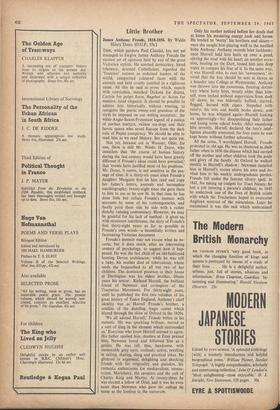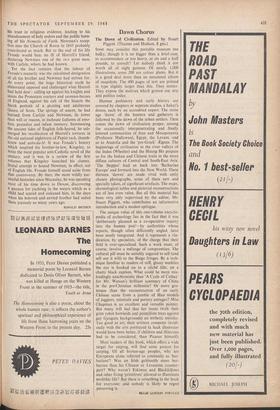Little Br other
James Anthony Froude, 1818-1856. By Waldo Hilary Dunn. (0.U.P., 35s.)
TIME, which pardons Paul Claudel, has not yet managed to forgive James Anthony Froude the nastiest set of opinions held by any of the great Victorian stylists. He scorned democracy, hated tolerance, detested Catholicism; regarded the 'Teutonic' nations as ordained leaders of the world, categorised coloured races with the animals and held cruelty justified in a righteous cause. All this he said in prose which, superb with conviction, matched Dickens for drama, Carlyle for pulpit force, Bagehot or Acton for massive, lucid elegance. It should be possible to admire him historically without wincing, to recognise the poetic sweep and grandeur of the myth he imposed on our willing ancestors: the white-Anglo-Saxon-Protestant legend of a nation of puritan martyrs, valiant sea-dogs and their heroic queen who saved Europe from the dark toils of Papist conspiracy. We should be able to read him as we read Malory. But not quite yet.
Not yet, because out in Wooster, Ohio, for one, there is still Mr. Waldo H Dunn, who considers that 'the course of human history during the last century would have been greatly different if Froude's ideas could have prevailed,' that 'events have justified most of his positions.' Mr. Dunn, it seems, is not sensitive to the pas- sage of time. It is thirty-six years since Froude's daughter Margaret first let him read and copy her father's letters, journals and incomplete autobiography; twenty-eight since she gave them to him to use as he saw fit. In that time he has done little but collate Froude's memoir with accounts by some of his contemporaries, and finally print them side by side with a rather sketchy running commentary. However, we may be grateful for his lack of method: it gives us, with minimum interference, the story of Froude's first thirty-eight years as far as possible in Froude's own words—a beautifully written and fascinating Victorian document.
Froude's memoir may not excuse what he be- came, but it does much, after an intervening century of psychology, to suggest how it hap- pened. He was the last child of an old-fashioned hunting Devon archdeacon; while he was still a baby, his mother died of tuberculosis, whose seeds she bequeathed to all but two of her children. The dominant presence in their house at Dartington was his eldest brother, fifteen years his senior: Richard Hurrell, the brilliant friend of Newman and co-inspirer of the Tractarian Movement. For thirty-eight years, until he published the first two volumes of his great history of Tudor England, Anthony's chief identity was as Hurrell Froude's brother, a satellite of the dazzling, tragic comet which blazed through the skies of Oxford in the 1820s.
'We all adored Hurrell,' Fronde writes in his memoir. 'He was sparkling brilliant, moved as a sort of king in the element which surrounded us.' Everyone who knew Hurrell seemed to agree. His father spoiled him, masters at Eton praised him, Newman loved and followed him as a genius. He was tall, thin, handsome, with memorable grey eyes; restlessly active, revelling in sailing, skating, slang and practical jokes. He glittered in argument, delighting and shocking friends with his originality and paradox, his romantic enthusiasms for medievalism, monas- ticism, Mariolatry, the cavaliers and the cult of Charles King and Martyr. At twenty-three he was elected a fellow of Oriel, and it was he even more than Newman who gave the college its name as the liveliest in the university. Only his mother noticed before her death that at home his mastering energy took odd forms. He tended to 'worry' his brothers and sisters— once she caught him playing wolf to the terrified baby Anthony. Anthony records later incidents: once Hurrell held him heels up over a pond, stirring the mud with his head; on another occa- sion, boating on the Dart, tossed him into deep water to conquer his fear of it. In the same way, it was Hurrell who, to cure his `sawneyness,' in- sisted that the boy should be sent at eleven as a boarder into College at Westminster. Anthony was thrown into the cavernous, freezing dormi- tory where forty boys, mostly older than him- self, were locked without supervision from dusk till dawn; he was hideously bullied, starved, flogged, burned with cigars. Stupefied with misery, his wits and health broke down; sent home, he was whipped again—Hurrell looking on approvingly—for disappointing their father and losing some school books. After examining him severely, Hurrell declared the boy's intel- ligence absurdly overrated; for four years he was kept home without further schooling.
All the same, 'I worshipped Hurrell; Fronde protested in old age. He was as shattered as their father when in 1836 the disease which had carried off the mother and other children took the pride and glory of the family. At Oxford he walked meekly in Hurrell's shadow : Newman installed him in Hurrell's rooms above his own and in- vited him to his weekly undergraduate parties. Froude fell under the famous silvery spell; in 1841, for taking up cudgels for Tract Ninety, he lost a job tutoring a parson's children; in 1843 he undertook one of the lives of British saints with which the Tractarians hoped to overcome Anglican mistrust of the miraculous. Later he maintained it was this task which undermined
his trust in religious evidence, leading to his abandonment of holy orders and the public burn- ing of his Nemesis of Faith. Newman's recep- tion into the Church of Rome in 1845 probably contributed as much. But to the end of his life Froude would heat no ill of Hurrell's friend, declaring Newman one of the Iwo great men, With Carlyle, whom he had known.
Yet the fact remains that the labour of Froude's maturity was the calculated denigration of all his brother and Newman had striven for. At every point, the huge historical myth he elaborated opposed and challenged what Hurrell had held dear : calling up against his knights and saints the Protestant martyrs and yeoman-heroes of England, against his cult of the Stuarts the harsh portrait of a plotting and adulterous Queen of Scots. The springs of assent, he had learned from Carlyle and Newman, lie lower than will or reason, in inchoate fathoms of emo- tion, prejudice and infant memory. Summoning the ancient tides of English folk-hatred, he sub- merged his recollection of Hurrell's tortures in the old national nightmare of Papist rack, thumb- screw and auto-da-fe. It was Froude's history Which inspired his brother-in-law, Kingsley, to Write the most popular anti-Catholic novel of the century, and it was iii a review of the first volumes that Kingsley launched his clumsy, brutal attempt to hound Newman, in effect, out of English life. Froude himself stood aside from that controversy. By then, the most wildly suc- cessful historian since Macaulay, he was spending most of his time down in Devon, discovering a passion for yachting in the waters which as a Child had scared and sickened him, in the days When his beloved and envied brother had sailed them joyously so many years ago.
RONALD BEYDEN







































 Previous page
Previous page